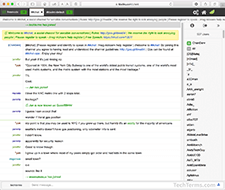IRC
Stands for "Internet Relay Chat." IRC is a service that allows people to chat with each other online. It operates on a client/server model where individuals use a client program to connect to an IRC server. Popular IRC clients include mIRC for Windows and Textual for OS X. Several web-based clients are also available, including KiwiIRC and Mibbit.
In order to join an IRC conversation, you must choose a username and a channel. Your username, also called a handle, can be whatever you want. It may include letters and numbers, but not spaces. A channel is a specific chat group within an IRC network where users can talk to each other. Some networks publish lists of available channels, while others require you to manually enter channel names in order to join them. Channels always begin with a hashtag followed by a name that represents their intended chat topic, such as "#teenchat," "#politics," or "#sports". Some IRC channels require a password while others are open to the public.
When you join a channel, the chat window will begin displaying messages people are typing. You can join the conversation by typing your own messages. While channel members can type whatever they want, popular channels are often moderated. That means human operators or automated bots may kick people out of the channel and even ban users who post offensive remarks or spam the channel with repeated messages.
While IRC was designed as a public chat service, it supports other features such as private messaging and file transfers. For example, you can use an IRC command (which typically begins with a forward slash "/") to request a private chat session with another user. Then you can use another IRC command to send the user a file from your local system.
NOTE: IRC was a popular way for users to connect online before social media became prevalent in the early 2000s. Today, many people still use IRC, but social media sites and apps are much more popular.
 Test Your Knowledge
Test Your Knowledge